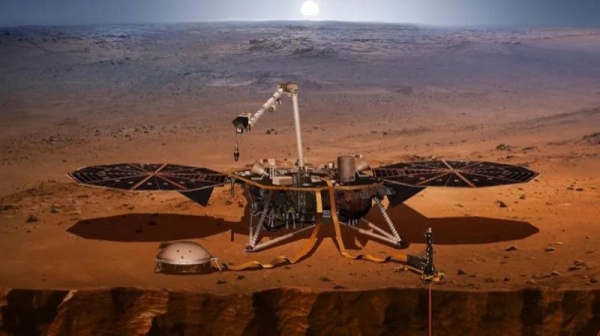Reservoir of liquid water found deep in Martian rocks
Scientists have uncovered a reservoir of liquid water beneath the rocky outer crust of Mars. This discovery comes from a fresh analysis of data from NASA’s Mars Insight Lander, which landed on the planet in 2018.
The lander was equipped with a seismometer that recorded vibrations—known as Mars quakes—over four years. By examining these quakes and the planet’s movements, researchers detected “seismic signals” indicative of liquid water.
While water exists as ice at the Martian poles and there is evidence of vapor in the atmosphere, this marks the first detection of liquid water on Mars. The results have been published in the Proceedings of the National Academy of Sciences.
Insight’s scientific mission concluded in December 2022 after the lander had spent four years listening to the planet’s “pulse.” During this period, it recorded over 1,319 quakes. By analyzing the speed of seismic waves, scientists determined the materials through which these waves were traveling.
Prof. Michael Manga from the University of California, Berkeley, who contributed to the research, noted that the methods used are similar to those employed in searching for water on Earth or for oil and gas. The analysis identified water reservoirs located at depths of approximately six to twelve miles (10 to 20 kilometers) within Mars’ crust.
“Understanding the Martian water cycle is critical for understanding the evolution of the climate, surface, and interior,” said lead researcher Dr Vashan Wright, from UC San Diego’s Scripps Institution of Oceanography.
Prof Manga added that water was “the most important molecule in shaping the evolution of a planet”. This finding, he said, answers a big question “Where did all the Martian water go?”.
Studies of the surface of Mars – with its channels and ripples – show that, in ancient times, there were rivers and lakes on the planet.
But for three billion years, it has been a desert.
Some of that water was lost to space when Mars lost its atmosphere. But, said Prof Manga, here on Earth, “much of our water is underground and there’s no reason for that not to be the case on Mars too”.
The Insight probe was only able to record directly from the crust beneath its feet, but the researchers expect that there will be similar reservoirs across the planet. If that is the case, they estimate that there is enough liquid water on Mars to form a layer across the surface that would be more than half a mile deep.
However, they point out, that the location of this Martian groundwater is not good news for billionaires with Mars colonization plans who might want to tap into it.
“It’s sequestered 10-20km deep in the crust,” explained Prof Manga.
“Drilling a hole 10km deep on Mars – even for [Elon] Musk – would be difficult,” he told BBC News.
The discovery could also point to another target for the ongoing search for evidence of life on Mars.
“Without liquid water, you don’t have life,” said Prof Manga. “So if there are habitable environments on Mars, those may be now deep underground.”


